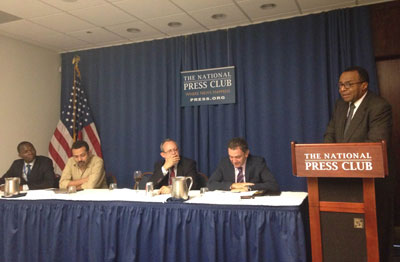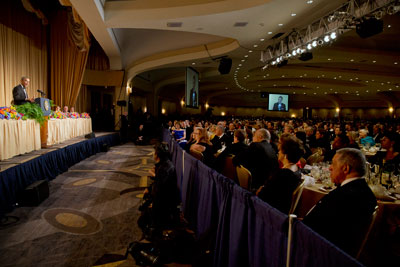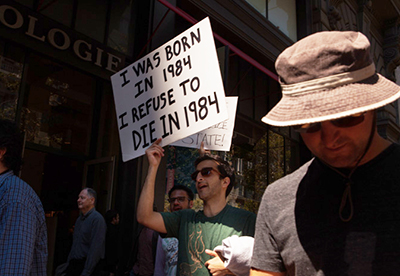
First US-Africa summit short on press freedom, other human rights
Top African and U.S. leaders are meeting next week in Washington in a first-of-its-kind summit focused on African development. But critics argue the summit is flawed in design, overlooking human rights such as freedom of expression and barring civil society actors from bilateral discussions.
No press freedom without Internet freedom
Four years ago, when CPJ launched its Internet Advocacy program, we were met with lots of encouragement, but also some skepticism. “Why do you need a program to defend the Internet?” one supporter asked. “You don’t have a special program to defend television, or radio, or newspapers.” But the Internet is different. Increasingly, when it…
TSA policy change could compound security concerns for journalists in transit
On Sunday, the U.S. Transportation Security Administration announced a new policy requiring that travelers to the United States turn on their devices at the request of airport security personnel. Devices that cannot be powered on will be barred from the aircraft, and passengers in possession of such devices may also be subjected to additional screening.…
In the wake of US pullout, Afghan journalists need protection
In the aftermath of this week’s foreign policy speech by President Barack Obama and discussions on the imminent pullout of U.S. troops from Afghanistan, we need to think once again of the implications this retreat will have for the thousands of Afghans who for more than a decade have worked not only with the military,…

Obama transparency record remains unimpressive
Nearly seven months ago, CPJ published its first in-depth report on press freedom in the United States, concluding that the Obama administration’s aggressive prosecution of leakers of classified information, broad surveillance programs, and moves to stem the routine disclosure of information to the press meant that the president had fallen far short of his campaign…
Media surveillance and ‘the day we fight back’
Today, a broad coalition of technology companies, human rights organizations, political groups, and others will take to the Web and to the streets to protest mass surveillance. The mobilization, known as “The Day We Fight Back,” honors activist and technologist Aaron Swartz, who passed away just over a year ago. Throughout the day, the campaign…

Obama must chart clearer course on surveillance policy
Tonight President Obama has another opportunity to redirect the country’s out-of-control surveillance programs during his annual State of the Union address. He should seize it. The president’s much-anticipated January 17 speech about U.S. surveillance policy, which came in response to outrage over National Security Agency spying, left much unsaid–and many of the commitments he did…

Obama’s legacy on the line with surveillance policy
When President Obama takes the lectern to discuss U.S. surveillance policy, as he is expected to do Friday, those hoping for sweeping reform are likely to be disappointed. As reported in The New York Times, the president appears poised to reject many of the recommendations of his Review Group on Intelligence and Communications Technologies, a…
While tech companies call for spying reform, telcos silent
On Monday, eight of the world’s leading technology companies set aside their rivalries to issue a direct challenge to U.S. lawmakers: lead the world by example and fix America’s broken surveillance state. Although the tech companies’ statement sends a powerful message, notably absent from the letter’s signatories is the appearance of a single telecommunications company,…
Take this survey on digital safety, then take these steps
It is an extraordinarily difficult time to be a journalist. Nearly every month, the digital security landscape shifts–new surveillance concerns are unearthed and freshly drafted laws are introduced that seek to curb freedom of expression under the guise of national security.